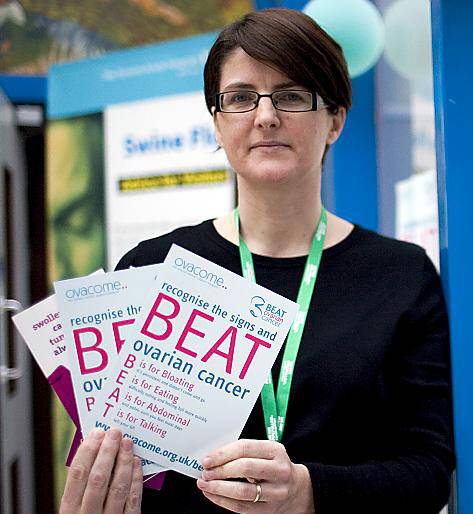Spot the signs of ovarian cancer
Reporter: MARINA BERRY
Date published: 17 March 2010

Amanda Storey . . . raising cancer awareness
OLDHAM Macmillan nurse Amanda Storey is urging women to learn to spot the symptoms of ovarian cancer.
Taking the time to find out what they are could save your life — this is the message being sent out during ovarian cancer awareness month.
Run by Macmillan Cancer Support, the campaign aims to reach out to women in Oldham to tell them how important it is to go to their doctor if they notice any symptoms associated with the disease.
Around 6,600 women in the UK are diagnosed with ovarian cancer every year.
It is most common in women over 50, but can affect all ages
Symptoms include loss of appetite or difficulty eating and feeling full, persistent vague indigestion, nausea, excessive gas (wind) and a bloated, full feeling.
Unexplained changes in weight and swelling in the abdomen, pain in the lower abdomen or back, and changes in bowel or bladder habits, such as constipation, diarrhoea or needing to pass urine more often, and pain during sex should also be checked out.
Macmillan nurse specialist Amanda Storey, who is based at the Royal Oldham Hospital, sent this message to all women: “It is important that if you develop any of these symptoms and they occur on a regular basis, you get them checked by your doctor.
“If after your visit you still feel unhappy do go back again. The earlier any cancer is diagnosed, the greater chance there is of survival.”
Amanda explained that ovarian cancer symptoms are common to other conditions, so experiencing them does not necessarily mean cancer.
But if they persist, it is important to get them checked out.
Ovarian cancer can sometimes run in families, so women with symptoms should tell their doctor if there are two or more cases of ovarian or breast cancer in their family.
Macmillan has developed an online tool to help women assess their own risk of inherited breast and ovarian cancer, to ease the concerns of women with a family history of the disease.
Called OPERA, it explains that fewer than one in ten are the result of an inherited faulty gene, and many people worry unnecessarily.
Ovarian cancer is the fourth most common cancer in women in the UK. It’s causes are not completely understood, but the risk of developing it increases with age.
More than eight out of ten cases are in women over the age of 50, mostly after the menopause.
To find out more about ovarian cancer and OPERA, visit www.macmillan.org.uk or call 0808-808 0000.
Most Viewed News Stories
- 1Tributes paid following death of hugely respected Oldham community figure Dale Harris
- 2You can score free tickets to a Latics game while supporting Dr Kershaw’s Hospice
- 3Primary school in Uppermill considers introducing new ‘faith-based’ entry criteria to tackle...
- 4Public inquiry announced into rail upgrade that could leave villages ‘cut off’ for months
- 5Trio arrested, drugs and weapons seized following Chadderton raid




